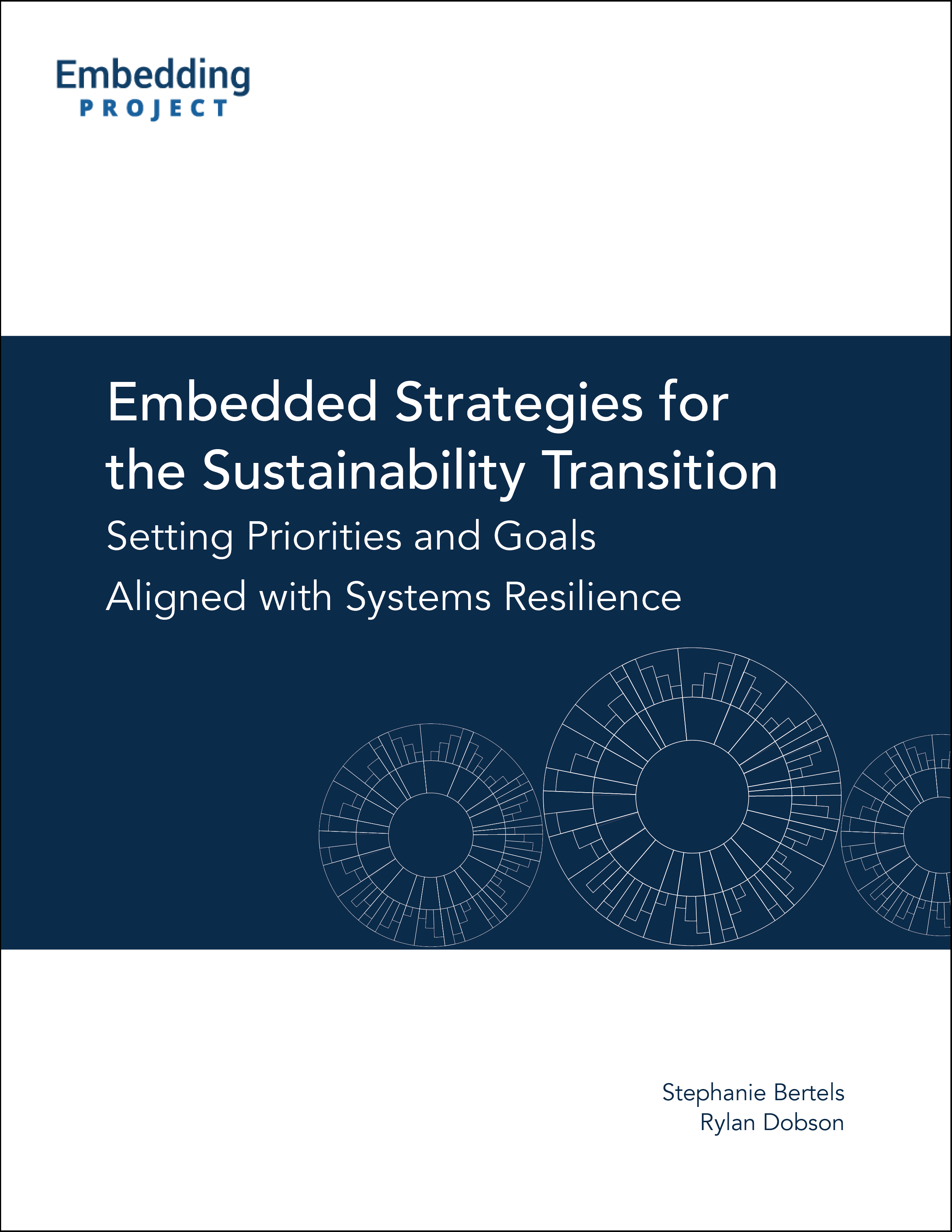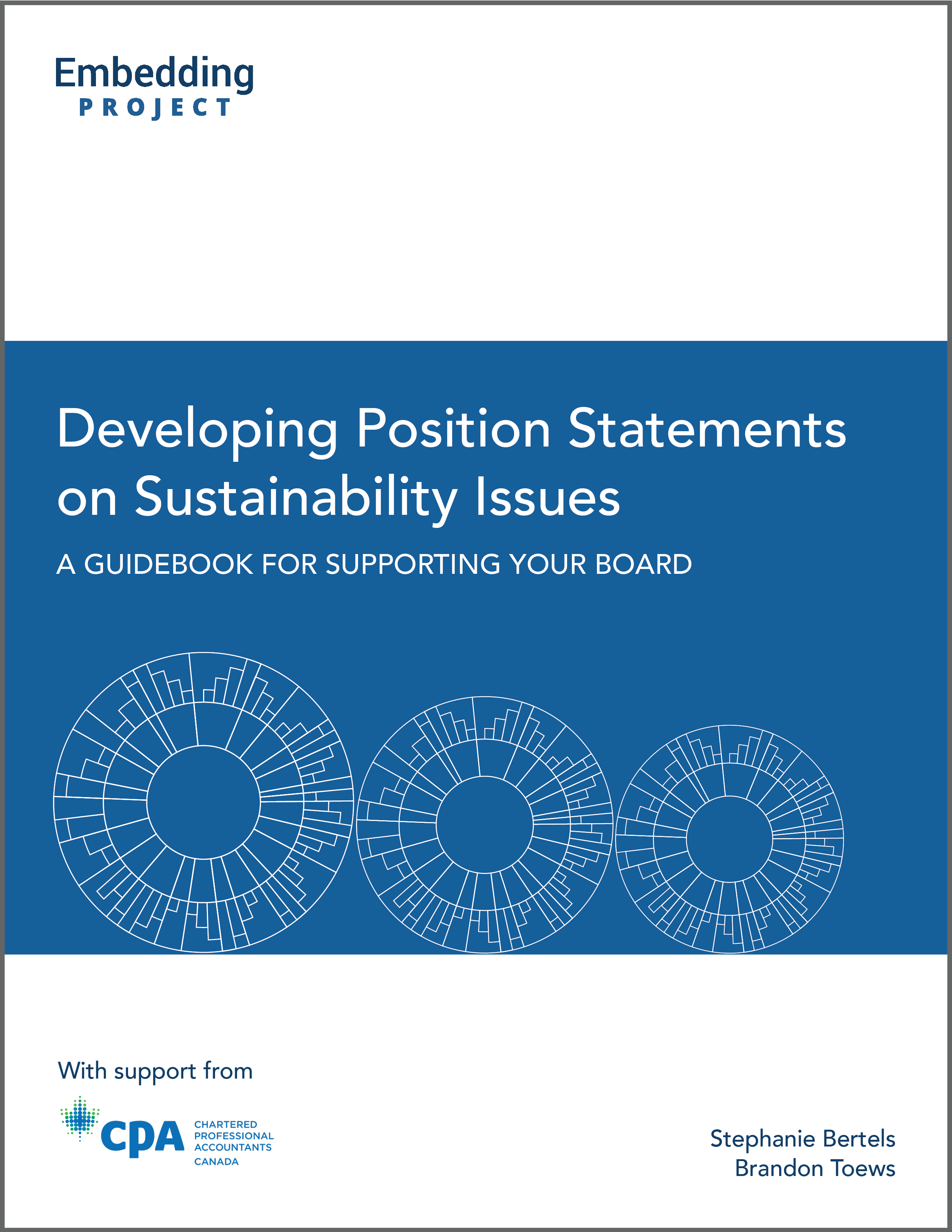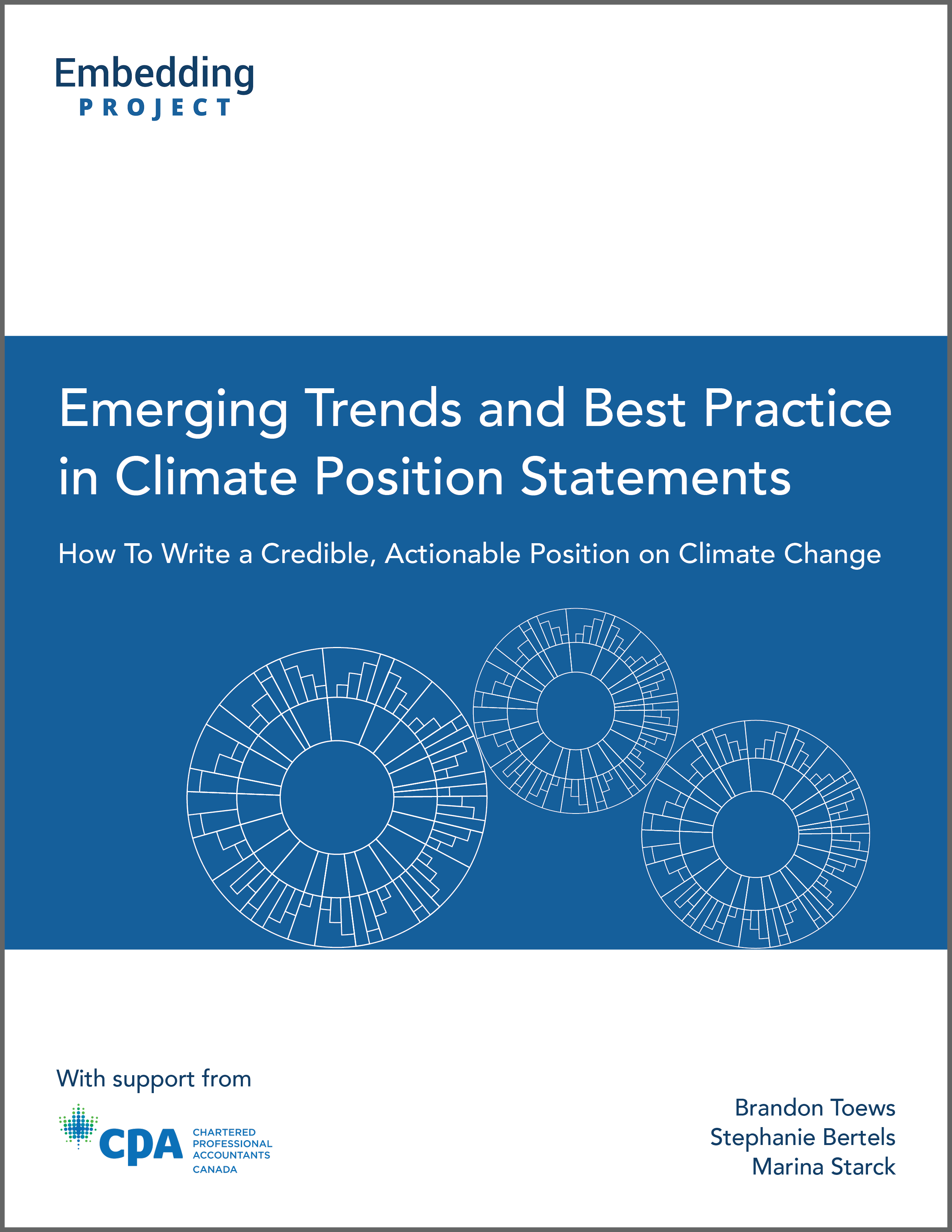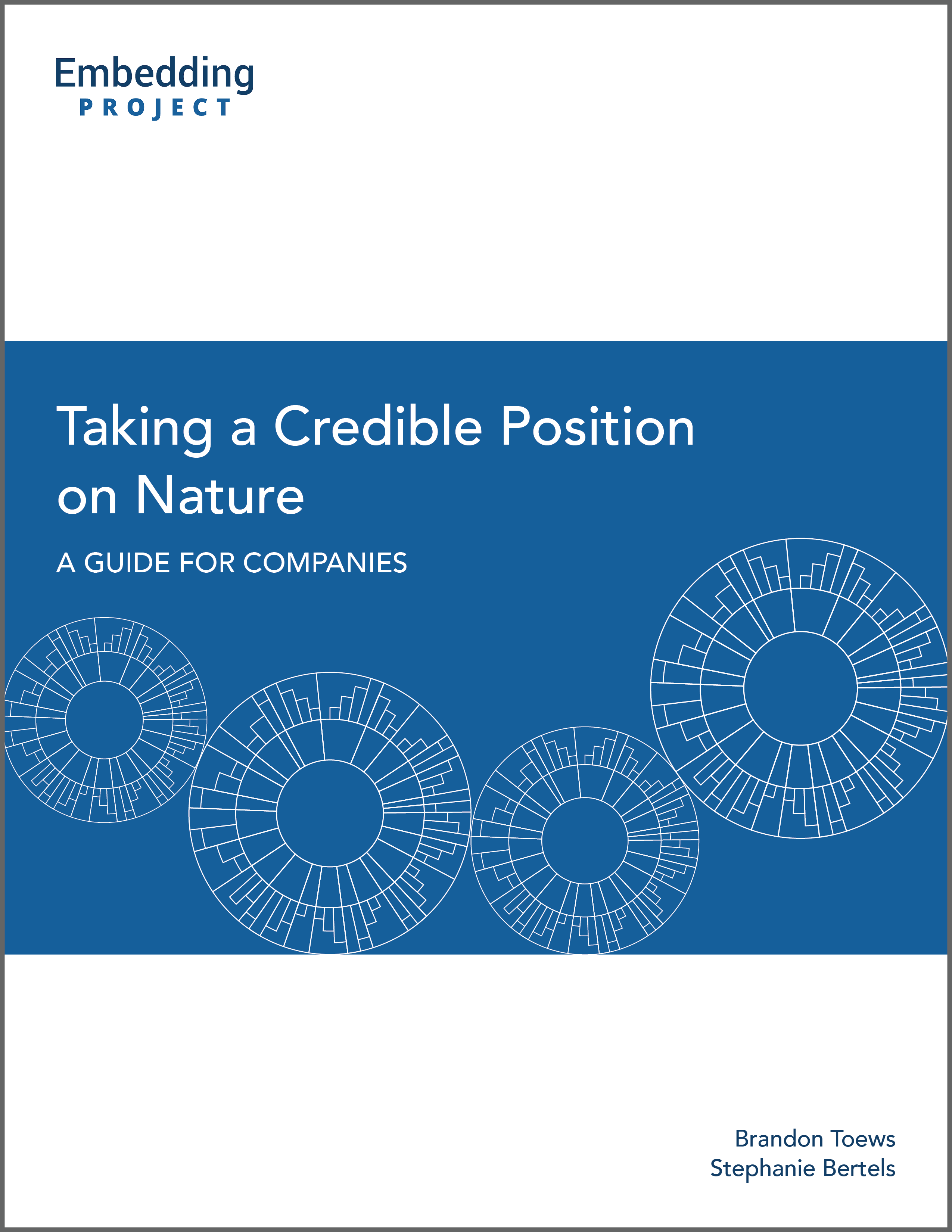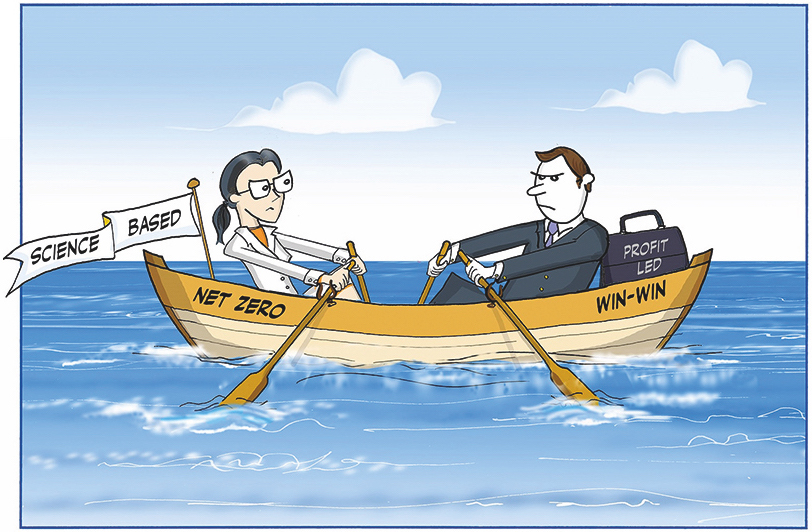Acknowledge
Description
These resources will help you to articulate clear public positions with respect to your most relevant social, environmental, or governance issues in a way that explains your understanding of the issue, links the issue to your strategy, and clarifies the actions you will take to adhere to relevant thresholds and bring about positive systems change.
Share this Practice on:LinkedIn
Resources
Embedded Strategies for the Sustainability Transition
It is time for companies to take a very different approach to corporate strategy.
Our Embedded Strategies guide helps companies respond to the growing calls for businesses to articulate their purpose and their strategy in alignment with the need to shift the global economy towards the reduction of inequality, a rapid climate transition, the preservation of biodiversity, and the elimination of waste.
This guide will help you to develop a contextual strategy and goals that ensure your company is doing its part to maintain the resilience of key social and environmental systems.
Building on our Road to Context guide with insights from 300+ interviews with senior executives, CEOs, board chairs, and directors, as well as our experiences supporting companies around the world, it outlines resources and tactics that can help your company to scan for emerging issues and risks; understand their implications for your business; understand your impacts and your potential for positive influence; prioritise where it makes sense to direct your efforts; and set your strategy and goals in alignment with delivering systems value.
Position Database
Is your company interested in taking a public position on an ESG issue?
To help companies develop strong, clear positions, we will maintain a public database containing leading positions articulated by large companies globally.
Our governance guide outlines how companies should articulate their positions, and we have applied this criteria to the positions featured in this database.
Developing Position Statements on Sustainability Issues
There is growing pressure among companies to link social and environmental limits to corporate strategy and goal-setting. However, the result is often a lengthy document that fails to make strategic connections between specific issues and their implications on business decision-making. We developed this guidebook to help you articulate a concise and transparent board level position on key environmental, social, and governance issues. Drawing upon in-depth analyses of over 4,000 board position statements; over 200 interviews with CEOs, directors, and board chairs; and concepts outlined in our series on the Road to Context, this guidebook provides a checklist for crafting a contextual board position statement and includes examples from a range of industries and global settings.
Emerging Trends and Best Practice in Climate Position Statements
Climate change is happening, and the impacts are intensifying. Companies are expected to take a position on climate change and outline an appropriate response. The Embedding Project’s climate position guide helps companies to articulate a concise and transparent board level position on climate change. Drawing on in-depth analyses of over 2,600 climate position statements, this guidebook provides a checklist for crafting a climate position statement with concrete examples from a range of industries and global settings.
Taking a Credible Position on Nature
There is growing pressure on companies to publicly acknowledge the unprecedented nature loss we face, and what they plan to do to address it. To help them do so, we reviewed over 1,000 statements on nature loss, biodiversity, and ecosystem stewardship from a wide range of geographies and industries, and identified examples of how companies are explaining the issue of nature loss, linking the issue of nature loss to their strategy, and clarifying their commitments to protect and restore nature. We hope this guide is helpful to you in articulating your own credible position statement on protecting and restoring nature.
Are Corporate Position Statements on Sustainability Worth the Time and Effort?
Wondering if taking a corporate position on key sustainability issues is worth your organisation's time and effort? This blog post discusses how position statements can be an important avenue for productive debate, work to clarify expectations, and provide accountability for your sustainability commitments.
Companies Need to Take a Stand. Here’s How to Do It Right.
More than ever before, the public has turned its attention to business leaders and said “how are you going to be a part of the solution?” To help companies take a credible position, we have created a straight-forward eight-step approach that will help you to craft a comprehensive yet concise position statement on key issues.
From win-win to net zero: would the real sustainability please stand up?
This article is a great place to start if you are confused about the scale and scope of action required by industry to credibly address climate change. The article explores how two fundamentally different interpretations of ‘sustainability’ have come to exist: a net zero imperative that is informed by science and acknowledges social and environmental thresholds, and a type of "win-win" sustainable business model that favours “sustainable growth” and tries to promote palatable (yet inadequate) amendments to the status quo. Duncan Austin explains how net zero commitments are an imperative for stopping and reversing climate change, and that "win-win" cannot deliver the change we need in time. This article will also help you to understand how - and why - it is necessary for us to reimagine prosperity and to conceive of and create an economy based on no growth or even shrinking growth.
Graduating from externalities, ending the grift
Externalities are not an "accident" of our linear economic system. They are a construct of the system, constantly reinforced and affirmed. This thought-provoking article dispels the myth that externalities are inevitable, fault-free, and sometimes even virtuous, and can help you to build your awareness of what a more thoughtful and equitable economic system may look like.
Share this Practice on:LinkedIn
